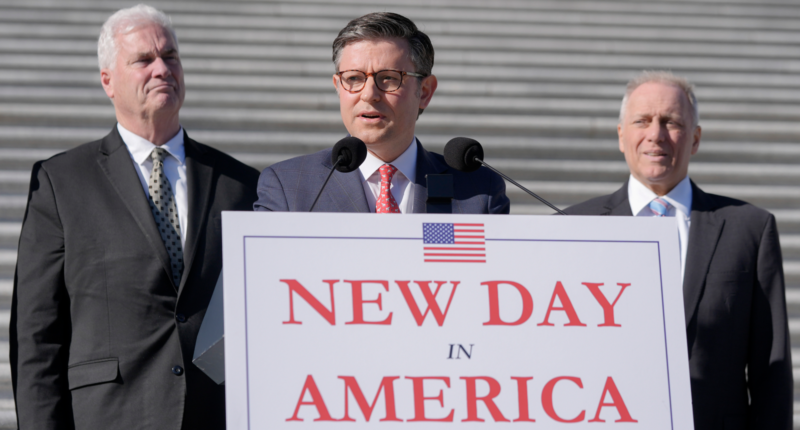WASHINGTON — A tax break for millionaires, and almost everyone else.
An end to the COVID-19-era government subsidies that some Americans have used to purchase health insurance.
Restrictions on food assistance programs, particularly affecting women and children, as well as other safety nets. Reversals of green energy initiatives introduced during the Biden administration. Increase in deportations and reduction of government jobs as part of an initiative to reduce bureaucracy.
Having won the election and sweeping to power, Republicans are planning an ambitious 100-day agenda with President-elect Donald Trump in the White House and GOP lawmakers in a congressional majority to accomplish their policy goals.
Atop the list is the plan to renew some $4 trillion in expiring GOP tax cuts, a signature domestic achievement of Trump’s first term and an issue that may define his return to the White House.
“What we’re focused on right now is being ready, Day 1,” said House Majority Leader Steve Scalise, R-La., after meeting recently with GOP colleagues to map out the road ahead.
The policies emerging will revive long-running debates about America’s priorities, its gaping income inequities and the proper size and scope of its government, especially in the face of mounting federal deficits now approaching $2 trillion a year.
The discussions will test whether Trump and his Republican allies can achieve the kinds of real-world outcomes wanted, needed or supported when voters gave the party control of Congress and the White House.
“The past is really prologue here,” said Lindsay Owens, executive director of the Groundwork Collaborative, recalling the 2017 tax debate.
Trump’s first term became defined by those tax cuts, which were approved by Republicans in Congress and signed into law only after their initial campaign promise to “repeal and replace” Democratic President Barack Obama’s health care law sputtered, failing with the famous thumbs-down vote by then-Sen. John McCain, R-Ariz.
The GOP majority in Congress quickly pivoted to tax cuts, assembling and approving the multitrillion-dollar package by year’s end.
In the time since Trump signed those cuts into law, the big benefits have accrued to higher-income households. The top 1 percent – those making nearly $1 million and above – received about a $60,000 income tax cut, while those with lower incomes got as little as a few hundred dollars, according to the Tax Policy Center and other groups. Some people ended up paying about the same.
“The big economic story in the U.S. is soaring income inequality,” said Owens. “And that is actually, interestingly, a tax story.”
In preparation for Trump’s return, Republicans in Congress have been meeting privately for months and with the president-elect to go over proposals to extend and enhance those tax breaks, some of which would otherwise expire in 2025.
That means keeping in place various tax brackets and a standardized deduction for individual earners, along with the existing rates for so-called pass-through entities such as law firms, doctors’ offices or businesses that take their earnings as individual income.
Typically, the price tag for the tax cuts would be prohibitive. The Congressional Budget Office estimates that keeping the expiring provisions in place would add some $4 trillion to deficits over a decade.
Adding to that, Trump wants to include his own priorities in the tax package, including lowering the corporate rate, now at 21% from the 2017 law, to 15%, and doing away with individual taxes on tips and overtime pay.
But Avik Roy, president of the Foundation for Research on Equal Opportunity, said blaming the tax cuts for the nation’s income inequality is “just nonsense” because tax filers up and down the income ladder benefited. He instead points to other factors, including the Federal Reserve’s historically low interest rates that enable borrowing, including for the wealthy, on the cheap.
“Americans don’t care if Elon Musk is rich,” Roy said. “What they care about is, what are you doing to make their lives better?”
Typically, lawmakers want the cost of a policy change to be offset by budget revenue or reductions elsewhere. But in this case, there’s almost no agreed-upon revenue raisers or spending cuts in the annual $6 trillion budget that could cover such a whopping price tag.
Instead, some Republicans have argued that the tax breaks will pay for themselves, with the trickle-down revenue from potential economic growth. Trump’s tariffs floated this past week could provide another source of offsetting revenue.
Some Republicans argue there’s precedent for simply extending the tax cuts without offsetting the costs because they are not new changes but existing federal policy.
“If you’re just extending current law, we’re not raising taxes or lowering taxes,” said Sen. Mike Crapo, R-Idaho, the incoming chairman of the Senate Finance Committee, on Fox News.
He said the criticism that tax cuts would add to the deficit is “ridiculous.” There is a difference between taxes and spending, he said, “and we just have to get that message out to America.”
At the same time, the new Congress will also be considering spending reductions, particularly to food stamps and health care programs, goals long sought by conservatives as part of the annual appropriations process.
One cut is almost certain to fall on the COVID-19-era subsidy that helps defray the cost of health insurance for people who buy their own policies via the Affordable Care Act exchange.
The extra health care subsidies were extended through 2025 in Democratic President Joe Biden’s Inflation Reduction Act, which also includes various green energy tax breaks that Republicans want to roll back.
The House Democratic leader, Rep. Hakeem Jeffries of New York, scoffed at the Republican claim that they’ve won “some big, massive mandate” – when in fact, the House Democrats and Republicans essentially fought to a draw in the November election, with the GOP eking out a narrow majority.
“This notion about some mandate to make massive, far-right extreme policy changes, it doesn’t exist – it doesn’t exist,” Jeffries said.
Republicans are planning to use a budgetary process, called reconciliation, that allows majority passage in Congress, essentially along party lines, without the threat of a filibuster in the Senate that can stall out a bill’s advance unless 60 of the 100 senators agree.
It’s the same process Democrats have used when they had the power in Washington to approve the Inflation Reduction Act and Obama’s health care law over GOP objections.
Republicans have been here before with Trump and control of Congress, which is no guarantee they will be able to accomplish their goals, particularly in the face of resistance from Democrats.
Still, House Speaker Mike Johnson, R-La., who has been working closely with Trump on the agenda, has promised a “breakneck” pace in the first 100 days “because we have a lot to fix.”
___
The story has been corrected to reflect that Lindsay Owens of the Groundwork Collaborative spoke of ‘income inequality,’ not ‘income equality.’
The video in the player above is from a previous report.
Copyright © 2024 by The Associated Press. All Rights Reserved.

















